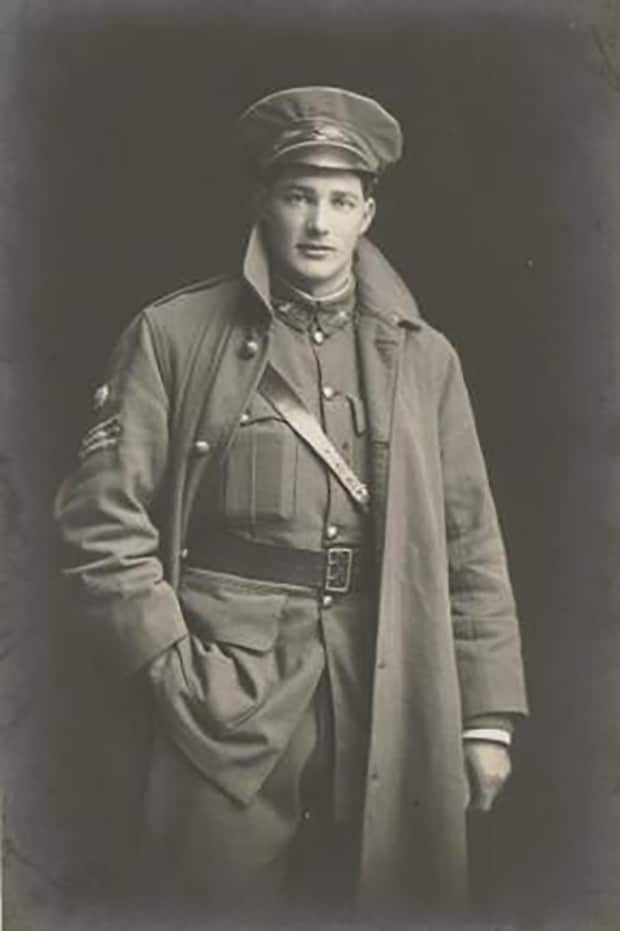Captain Alfred Walter Williamson
14th Battalion
Died Bullecourt, France, April 11, 1917,
aged 23 years
11 games for Carlton, 1912-1914
Ponder the following account of Alf Williamson and it’s hard not to invoke an image of the former Carlton Premiership player Anthony Koutoufides.
“He stood six feet in his socks, and was as handsome as a Greek god. He was the men’s ideal of what a man should be, and to know him was to love him.”
The above quote, attributed to one of Alf’s many Army colleagues, says much for the genuine esteem with which “Lofty” Williamson - fallen soldier, former Carlton (and later Melbourne) footballer and great uncle to Gary Ablett senior - was truly held.
Born in the quaintly-named Gippsland hamlet of Cowwarr in 1893, Alfred Walter Williamson grew into a tall, well-proportioned youngster who earned his nickname during schooldays because he always stood out in a crowd.
Renowned for his football ability, larrikin streak and wry sense of humour, Alf’s links to Carlton can be sourced to 1911 when his dominant form for the Melbourne Teachers Training College’s 1st XVIII caught the eye of a talent scout.
On May the 18 of the following year, 1912, Alf took to the field for the first time in Navy Blue, for what would prove a typically hard-fought contest with the inner city rival Collingwood. The match was thought to have ended in a draw, but Collingwood was adjudged one-point winners after the goal umpires met midwicket to confirm their scorecards.

Alf Williamson played 11 games for Carlton from 1912-1914.
Alf found his feet in 1913 as a half-forward of some renown, but a three-week suspension for elbowing an Essendon opponent in the 10th round match would cost him the next three games. He would return for the 14th round and feature in the remaining eight games of the season, during which time he graduated as a teacher and joined the staff of Melbourne High School.
Alf’s 11th and final appearance in the No.22 dark Navy Blue guernsey now worn by Jason Tutt came in May of 1914, against the now-defunct University team on the mighty MCG. Carlton steamrolled the students by 12 goals, as events on the other side of the globe were about to plunge Europe into bloody war.
The following month, and for reasons unclear, Alf resolved to pursue his career with the Fuschias. Soon after he copped another three matches for unduly rough play in a contest with St Kilda.
On his return against Richmond, Alf was again reported – and this time suspended for a total of 15 matches – in a Tribunal judgment which would have tragic consequences. For with no prospect of playing senior football in the short-term, Alf responded to the call for volunteers to fight for King and country.
Alf was assigned to the 8th draft of reinforcements for the 14th Battalion, which at the time was heavily engaged in the ill-fated Dardanelles campaign. It was said that under immense hardship and constant danger at Gallipoli, Alf’s qualities shone through.
As the Australian casualties mounted, he was always amongst the first in line for promotion. Rising from Corporal to Sergeant to Sergeant-Major within months, he was eventually commissioned in the field in February 1916.
Alf was then 22 then – the same age as Dylan Buckley.
In the wake of the successful withdrawal from ANZAC Cove, the 14th Battalion was deployed to Palestine for respite, before being sent to the trenches of Western France and Belgium.
On April 11, 1917, Captain Alf Williamson led his company in a charge across no man’s land at Bullecourt. The attack was initially successful, and the first line of German trenches was captured, but he was last seen urging his men toward the second line of trenches when an artillery barrage rained down right on top of them.
Alf’s body was never identified. Accordingly, his name appears with the hundreds of others venerated on the Australian War Memorial at Villers-Brettoneux.


